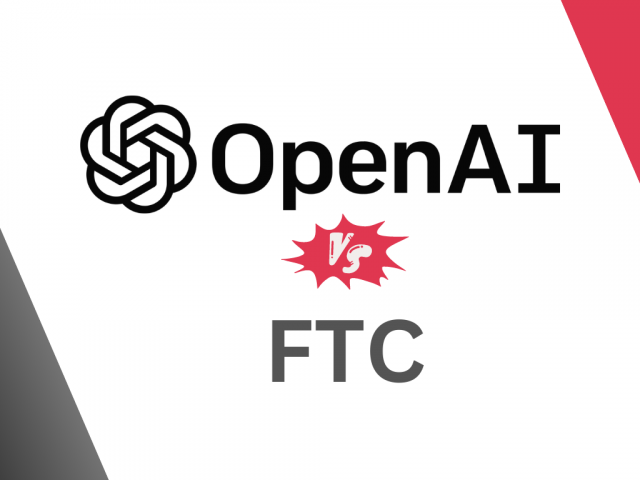OpenAI Facing FTC Investigation: Examining The Potential Consequences For ChatGPT And AI Development

Table of Contents
The FTC's Concerns Regarding OpenAI and ChatGPT
The FTC's investigation into OpenAI likely stems from several key concerns surrounding ChatGPT's development and deployment. These concerns highlight the complex ethical and legal challenges inherent in the rapid advancement of generative AI technologies.
Data Privacy and Security Issues
The FTC is likely investigating OpenAI's handling of user data, focusing on potential violations of data privacy regulations. The sheer volume of data used to train ChatGPT, and the potential for personally identifiable information (PII) to be inadvertently included and utilized, raises serious concerns.
- Concerns about the collection and use of personally identifiable information (PII) within prompts and conversations. ChatGPT's ability to process and learn from user inputs necessitates careful consideration of how PII is handled and protected. Any unauthorized collection or use of such data could represent a serious breach of trust and a violation of privacy laws.
- Potential violations of data privacy regulations like GDPR and CCPA. OpenAI, as a global company, must comply with various international and regional data privacy regulations. The investigation will likely scrutinize OpenAI's adherence to these regulations, including consent mechanisms, data security protocols, and data retention policies.
- The lack of transparency surrounding data usage and security protocols. Clear and concise communication with users about how their data is collected, used, and protected is paramount. A lack of transparency in this area could contribute to the FTC's concerns and potential legal action.
Algorithmic Bias and Discrimination
Another critical area of concern for the FTC is the potential for algorithmic bias and discrimination within ChatGPT's algorithms. AI systems trained on large datasets inevitably reflect the biases present in that data, leading to potentially discriminatory outcomes.
- The risk of perpetuating societal biases through biased training data. The data used to train ChatGPT may contain biases reflecting existing societal inequalities. These biases can be amplified and perpetuated by the AI, leading to unfair or discriminatory results.
- The potential for discriminatory outcomes in various applications of ChatGPT. Depending on how ChatGPT is utilized, biased outputs could have far-reaching consequences, affecting areas like loan applications, hiring processes, and even criminal justice.
- The need for robust mechanisms to detect and mitigate bias in AI systems. OpenAI, and the wider AI community, needs to develop and implement effective methods for identifying and mitigating bias in AI models. This includes carefully curating training data, developing bias detection algorithms, and ensuring diverse representation in development teams.
Misinformation and Harmful Content Generation
The ability of ChatGPT to generate human-quality text also poses the risk of creating and disseminating misinformation and harmful content. This capability raises significant ethical and societal concerns.
- The challenge of controlling the generation of harmful or inappropriate content. ChatGPT's capacity to create convincing but false narratives makes it a potential tool for malicious actors seeking to spread propaganda or disinformation.
- The ethical implications of using AI to generate convincing but false narratives. The ease with which ChatGPT can generate realistic-sounding text necessitates careful consideration of its ethical implications and potential misuse.
- The need for effective safeguards to prevent the misuse of generative AI tools. Developing effective content moderation and safety protocols is crucial to mitigate the risk of harmful content generation and dissemination. This includes mechanisms to detect and flag potentially harmful outputs and mechanisms to prevent malicious use.
Potential Consequences for OpenAI and ChatGPT
The OpenAI FTC investigation could have significant repercussions for the company and its flagship product, ChatGPT. The consequences could extend beyond financial penalties to impact OpenAI’s reputation, development practices, and the broader AI landscape.
Financial Penalties and Legal Action
The FTC possesses the authority to impose substantial financial penalties on OpenAI if violations are found. These penalties could severely impact OpenAI’s financial stability and future development.
- The severity of penalties will depend on the nature and extent of any violations. The FTC’s decision will be based on the specifics of the alleged violations and their impact.
- Potential impact on OpenAI's funding and future investments. Significant fines could hamper OpenAI’s ability to secure future funding and investments, potentially slowing down AI research and development.
- The precedent this case sets for future AI companies. The outcome of the OpenAI FTC investigation will create a significant precedent for other AI companies, shaping the regulatory landscape for years to come.
Reputational Damage and Loss of User Trust
Negative publicity surrounding the investigation could inflict substantial damage on OpenAI's reputation and erode user trust in ChatGPT.
- The importance of transparency and accountability in building public confidence. OpenAI needs to demonstrate transparency and accountability in its data handling practices and algorithmic development to regain public trust.
- The potential impact on ChatGPT's user base and market share. Negative publicity could lead to a decline in users, impacting OpenAI's market position and revenue.
- The long-term implications for OpenAI's brand and market position. The long-term consequences for OpenAI's brand and market position depend on how effectively it addresses the FTC's concerns and rebuilds public trust.
Changes to ChatGPT’s Functionality and Development
To address the FTC's concerns, OpenAI may be compelled to implement substantial changes to ChatGPT's functionality and development processes.
- Implementation of stricter data privacy and security measures. OpenAI might need to enhance its data protection measures, including implementing more robust data encryption and access control mechanisms.
- Increased efforts to mitigate bias and promote fairness in algorithms. More rigorous bias detection and mitigation strategies will likely be implemented in the training and development of future models.
- Enhanced content moderation and safety protocols. More sophisticated content filtering and moderation systems will likely be needed to prevent the generation and spread of harmful content.
Broader Implications for AI Development and Regulation
The OpenAI FTC investigation holds profound implications for the future of AI development and regulation, potentially shaping the regulatory landscape for years to come.
Setting a Precedent for AI Regulation
The outcome of this investigation will establish a significant precedent for AI regulation, influencing the development of guidelines and standards for responsible AI practices.
- The establishment of guidelines and standards for responsible AI development. The investigation's outcome could spur the creation of clear guidelines and industry standards for ethical AI development.
- The potential for more stringent regulations on data privacy, algorithmic bias, and content moderation. The investigation could lead to stricter regulations in these crucial areas, impacting how AI systems are designed, trained, and deployed.
- The impact on innovation and competition in the AI sector. While increased regulation might curb some aspects of innovation, it could also foster greater trust and responsible development practices within the AI sector.
Conclusion
The FTC investigation into OpenAI and ChatGPT marks a pivotal moment for the AI industry. The potential consequences, ranging from financial penalties to significant changes in AI development practices, underscore the urgent need for responsible AI development and ethical considerations. The outcome of this OpenAI FTC investigation will shape the future regulatory environment and ultimately determine how AI technologies, like ChatGPT, are developed and deployed. Staying informed about the evolving situation surrounding the OpenAI FTC investigation is crucial for anyone interested in the future of AI. Understanding the implications of this case will be vital for navigating the evolving landscape of AI development and regulation.

Featured Posts
-
 Nyt Spelling Bee April 27 2025 Complete Solution With Clues
Apr 29, 2025
Nyt Spelling Bee April 27 2025 Complete Solution With Clues
Apr 29, 2025 -
 Mhairi Black And The Complexities Of Protecting Women And Girls From Misogyny
Apr 29, 2025
Mhairi Black And The Complexities Of Protecting Women And Girls From Misogyny
Apr 29, 2025 -
 Thunder Over Louisville Fireworks Show Canceled Due To Severe Ohio River Flooding
Apr 29, 2025
Thunder Over Louisville Fireworks Show Canceled Due To Severe Ohio River Flooding
Apr 29, 2025 -
 Shooting At North Carolina University One Dead Six Injured
Apr 29, 2025
Shooting At North Carolina University One Dead Six Injured
Apr 29, 2025 -
 Nyt Spelling Bee Solution February 25 2025
Apr 29, 2025
Nyt Spelling Bee Solution February 25 2025
Apr 29, 2025
